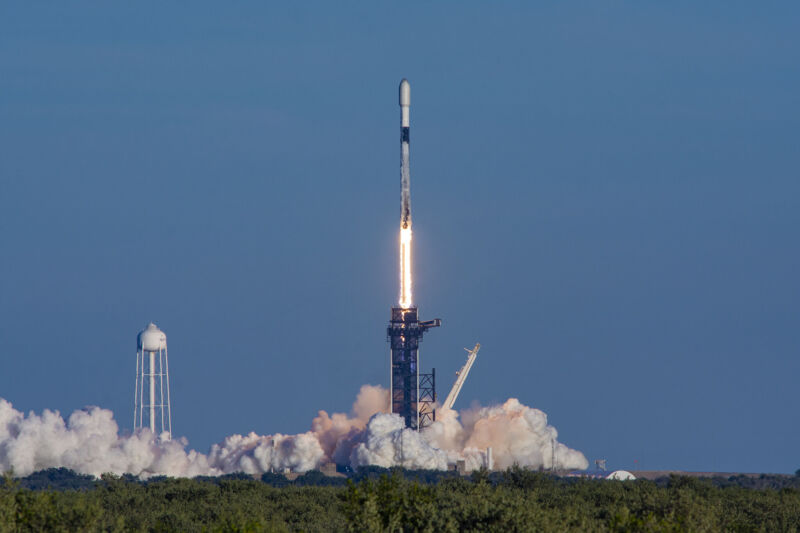The Falcon 9 also recently surpassed the space shuttle in total flights.
ERIC BERGER - 2/3/2022, 9:06 AM

Enlarge / A Falcon 9 rocket launches on a pillar of fire in January 2022.
SpaceX
SpaceX has been launching Falcon 9 rockets thick and fast of late. With 10 launches since the beginning of December, the company has flown rockets at a rate greater than one mission a week. And another launch could happen as soon as today, shortly after noon (18:13 UTC), with a Starlink satellite launch planned from Florida.
Lost amid the flurry of activity are some pretty significant milestones for the Falcon 9 rocket, which made its debut a little more than a decade ago.
Number of launches
The Falcon 9 rocket has now launched a total of 139 times. Of those, one mission failed, the launch of an International Space Station supply mission for NASA, in June 2015. Not included in this launch tally is the pre-flight failure of a Falcon 9 rocket and its Amos-6 satellite during a static fire test in September 2016.
Since the year 2020, the Falcon 9 has been the most experienced, active rocket in the United States, when it surpassed the Atlas V rocket in total launches. Globally, the still-flying Russian Soyuz and Proton rockets have more experience than the Falcon 9 fleet. The Soyuz, of course, remains the king of all rockets. It has more than 1,900 launches across about a dozen variants of the booster dating back to 1957, with more than 100 failures.
The Falcon 9 reached a notable US milestone in January, equaling and then exceeding the tally of space shuttle launches. During its more than three decades in service, NASA's space shuttle launched 135 times, with 133 successes. To put the Falcon 9's flight rate into perspective, it surpassed the larger shuttle in flights in about one-third of the time.
There is no way to know how many missions the Falcon 9 will ultimately fly. At its current rate, the rocket could reach 500 flights before the end of this decade. However, SpaceX is also actively working to put its own booster out of business. The success of the company's Starship project will probably ultimately determine how long the Falcon 9 will remain a workhorse.
Nevertheless, it seems likely the Falcon 9 will fly for a long time yet. That is because it now provides the only means for US astronauts to get into space. And while NASA's deep-space Orion vehicle and Boeing's Starliner spacecraft should come online within the next couple of years, the Falcon 9 rocket and Crew Dragon spacecraft will very likely remain the lowest risk, and lowest cost, means of putting humans into orbit for at least the next decade.Advertisement
Consecutive successes
Speaking of safety, this is where the Falcon 9 rocket has really shone of late. Since the Amos-6 failure during its static fire test, SpaceX has completed a record-setting run of 111 successful Falcon 9 missions in a row. It probably will be 112 after Thursday.
There are only two other rockets with a string of successful flights comparable to the Falcon 9. One is the Soyuz-U variant of the Russian rocket, which launched 786 times from 1973 to 2017. The other is the American Delta II rocket, which recently retired. (Eventually, the Atlas V rocket could also exceed 100 consecutive successes before its retirement later this decade.)
According to Wikipedia, amid its long run, the Soyuz-U rocket had a streak of 112 consecutive successful launches between July 1990 and May 1996. However this period includes the Cosmos 2243 launch in April 1993. This mission should more properly be classified as a failure. According to noted space scientist Jonathan McDowell, the control system of the rocket failed during the final phase of the Blok-I burn, and the payload was auto-destructed.
Taking this failure into account, the Soyuz-U had a run of 100 successful launches from 1983 to 1986. This happens to be the exact same number of consecutive successes by the Delta II rocket, originally designed and built by McDonnell Douglas and later flown by Boeing and United Launch Alliance. Overall the Delta II rocket launched 155 times, with two failures. Its final flight, in 2018, was the rocket's 100th consecutive successful mission.
So the Falcon 9 has now exceeded both the Soyuz-U and Delta II rockets for consecutive mission successes, and apparently its low flight insurance costs reflect this.
What seems remarkable about all of this is that the Falcon 9 amassed this safety record at the very same time SpaceX was experimenting with and demonstrating reuse. At the time of the Amos-6 failure in 2016, the company had yet to re-fly a single Falcon 9 first stage. Now it has pushed some of its boosters to fly 11 flights, and SpaceX has never lost a mission on a reused first stage, even though founder Elon Musk and other officials have explicitly said they are pushing the technology to find its limits.
That would seem to be a fairly powerful argument in favor of the safety of reusable launch.
No comments:
Post a Comment